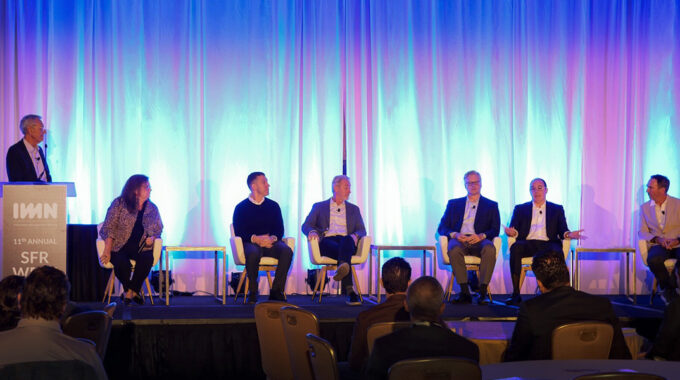CoreVest Finance recently attended the MBA CREF/Multifamily Housing Convention & Expo in San Diego, CA.…
Multi-Family Investing: Why Real Estate Investors Are Flocking To It

By: Mario Navarrete, Relationship Manager
As the holidays near and the year comes quickly to a close, 2017, in retrospect, has not dissapointed. My Q1 article talked about how 2017 will be an interesting year for investors and rental properties. The Feds talked about raising rates and, sure enough, they rose. I also mentioned that real estate investors who understood the rental space and could move quickly, would grow exponentially faster than before. As a testament to that growth, we saw record-breaking volumes at CoreVest last quarter and October came in at over $100m in funded rental assets alone.
What’s even more exciting, however, is the fact that many of our rental portfolio owners are now adding multifamily financing to their portfolios. At first, we didn’t look deep into this trend. However, now that a substantial number of our borrowers are asking us for guidance on how to invest in multi-family real estate, we’re focused on helping them get there. With this notion, I’ve dedicated this quarter’s blog accordingly.
What is multi-family real estate and how is it valued?
First and foremost, when I talk about multi-family, for the purposes of this blog I’m referring to assets that are 5 units or more. The brilliance of multi-family is that it’s value is largely created by its income. Whereas homes are valued based on the sale of similar assets or “comparables” in the immediate area, multi-family assets are heavily valued by their cash flow or Net Operating Income (NOI). As such, the more income you can get your assets to produce in conjunction with your ability to lower your assets’ expenses, the more valuable your assets ultimately become.
Multi-family lenders therefore underwrite a loan for you mostly based on the asset’s ability to perform. This is also the reason why most real estate portfolio lenders prefer to see investors with a year or two of experience in managing a portfolio of rental assets; their mindset being that seasoned investors will be able to better fine tune the asset to perform optimally thereby mitigating some risk to the lender and increasing the asset’s value.
Would you like to speak to a loan specialist?
Often times, you’ll hear lenders referred to as “partners” with you in real estate investing. Essentially you depend on them for the capital to acquire the asset and they depend on you to operate or manage the asset to its fullest potential. In my opinion, this symbiotic relationship between borrower and lender is critical in the rental space we are in. And, as a Relationship Manager here at CoreVest, I can tell you firsthand that it means everything for any deal that we execute upon.
What multi-family lender is best for me?
Not all lenders are created equal and there is not one lender who is right for everyone. With that being said, whether you’re a seasoned investor or someone new to Multi-Family investing, I think it is important to understand the challenges of getting a prime multi-family loan. By possessing this knowledge, you can start to assess what type of lender might be best for you or, perhaps even better, I hope some of you will realize there are more financing options out there than just the ones you have been looking at.
Generally speaking, you will hear that your Fannie/Freddie products are the best you can get and to a large degree, I would agree. If an investor can qualify for one of these loans, I’m the first one to say go get it. Fannie/Freddie products will have great options and great rates. The biggest issue for most investors however, is that it is difficult to qualify for these loans; not impossible, but difficult.
What are the challenges of a government-backed multi-family loan?
The top three challenges of a loan from Fannie/Freddie include:
-
- The 90 for 90 Rule – This Fannie/Freddie stipulation requires you to have the asset in question at 90% occupancy or higher for a minimum of 90 days to qualify for their loan. Fannie wants to see that rental history to ensure they have a stabilized asset and that you have not simply put a renter in place to qualify for the loan.If you have a 30-unit apartment complex for example, trying to get financed or refinanced during a window where at least 27 of the 30 units (90%) have been occupied for 90 days straight proves to be quite a challenge for many volatile markets today. Here at CoreVest, we do not have that requirement. Although we do want to see the asset occupied at 90%, as long as your asset is 90% occupied on the day we go to close, then we will fund the loan for you.
-
- The Net Worth/Liquidity Requirement – This Fannie/Freddie stipulation requires that for any loan they issue, the borrower must have a net worth equal to or more than the loan amount. Additionally, they also require that after the loan closes and you’ve paid your fees, down payment, etc., the borrower must still have 25% liquidity to the loan they issue. For example, let’s say you wish to buy a $5M 30-unit apartment complex. At 80% LTC, they will require you to come in with $1M cash and they will write you a $4M loan.However, in addition to the $1M you use for your down payment here, you need to show you have a net worth of at least $4M outside the assets in the loan and that you have an additional $1.25M liquid (25% of $4M) after the loan closes. Obviously this can prove to be a tall order even for a seasoned investor. Here at CoreVest, our net worth requirement is only 25% and we like to see that you have approx. 5% liquidity post funding; a much easier pill to swallow for investors.
- FICO Scores, BKs and Foreclosures – Generally speaking, Fannie/Freddie likes to see clean deals. They require a 650 Fico or better and you cannot have any Bankruptcies (BKs) or Foreclosures in the last 7 years. Many folks, including investors have had their credit affected since the 2008 recession so blemishes on credit are quite common these days. At CoreVest, we’re a little more forgiving and we will look at loan applications with a 620 FICO score or better. In some cases, if the borrower is very strong in all other aspects, we may even consider a 600 FICO. Moreover, as long as you have not had BKs or foreclosures within the last 3 years, we will still consider the loan application for you.Lastly, and this is not as big of a challenge but worth noting since it plays into almost every deal, both Fannie and Freddie typically stick to a 1.25-1.4 debt service coverage ratio (DSCR). At CoreVest, we look for a 1.20 DSCR for all loans over $1M.
As mentioned in my previous blog, the rental market is exploding and there are so many reasons to invest in multi-family real estate. From baby boomers downsizing, millennials bringing a new mindset to the idea of homeownership and their parents, who lost their homes in the ’08 crash, still left with a bitter taste in their mouth about the whole thing– to say there is an increasing demand for rental properties has been the understatement of the last few years and will continue to be so, in my opinion, for several years to come.
If you couple that demand with emerging markets coming out of the recession and the increased desire from investors to create more passive income through solid investments, it is really no surprise why so many investors are moving into the multi-family space to bolster their rental portfolios.
The Information Management Network (IMN) stated that 75% of multi-family housing inventory is classified as small or mid-cap which is where we at CoreVest like to help investors understand how to invest in multi-family real estate. Multi-Family investors are not only in primary markets, but are flocking more to Secondary and Tertiary markets. Therefore, the question I pose to you is: if you believe multi-family is where you want to invest, do you have the ideal financing partner to help you get there?
CoreVest is a leading provider of financing solutions to residential real estate investors. We provide attractive long-term debt products for stabilized rental portfolios as well as credit lines for new acquisitions. For more information about how Corevest can help grow your rental and rehab business, please call Mario Navarrete at 949.936.0007 or email [email protected].
#IG


